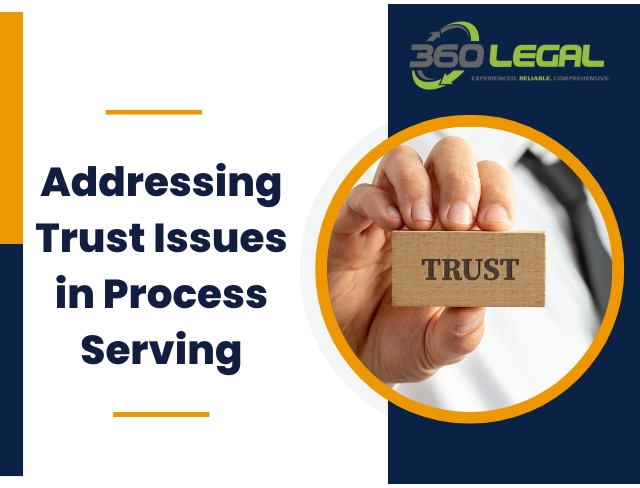Testing RSS Feeds.. ignore post.
Testing RSS Feeds.. ignore post.
Addressing Trust Issues in Process Serving

The legal services sector is a complex, multi-faceted industry that plays a crucial role in the functioning of any civilized society. However, it’s an industry that has historically been plagued by a lack of trust between service providers and clients. This trust deficit is particularly prominent in the process serving industry, which often serves as the initial point of contact between the legal system and the public.
Why Trust is Important in Legal Services
Trust is not just an intangible asset; it’s the bedrock upon which any successful legal service is built. When individuals or organizations need to serve legal documents, they require assurance that the process server will carry out the task effectively, ethically, with integrity, and within the boundaries of the law. Any failure to meet these criteria could have significant repercussions, including delays in legal proceedings or even a case being thrown out of court. This is why trust is of paramount importance in the process serving industry.
The Trust Gap: A Result of Myths and Misunderstandings 
Often, mistrust arises from a lack of understanding or miscommunication. For instance, people may have heard anecdotal stories about unethical behavior in the industry or might have misconceptions about the role of a process server. These misconceptions often lead to hesitation and doubt when it comes to employing the services of process serving companies.
The following is a DRAMATIZATION AND IS NOT AN ACTUAL EVENT: Imagine Sarah, a small business owner, who needs to serve an eviction notice to a tenant who has repeatedly violated lease terms. She’s heard troubling stories from friends who have had bad experiences with process servers—papers served late, or even never served at all, causing substantial legal issues and financial losses. As a result, Sarah decides to serve the notice herself, but lacking the knowledge and experience, she serves it incorrectly. This not only delays the legal proceedings but also jeopardizes her case, costing her both time and money.
The lesson? Mistrust, built on myths and misunderstandings, can sometimes lead people to make choices that are more detrimental than the perceived risk of entrusting a professional.
Building Trust Through Transparency and Accountability
One effective way to combat the trust deficit in the process serving industry is through increased transparency. Providing detailed information on how the process works, the laws governing service of process, and the qualifications of the process servers can go a long way in building confidence. Additionally, companies can maintain accountability through regular updates, employing technology to track the status of served papers, and prompt reporting.
Trust is the cornerstone of any meaningful relationship, particularly in sectors as sensitive and significant as legal services. For the process serving industry to function effectively and ethically, it must overcome the existing trust deficit. This can be achieved through education, transparency, and a steadfast commitment to accountability and ethical conduct. As clients become more informed and companies more transparent, the industry can look forward to a future where trust is not the exception but the norm.
Strategies for Overcoming Trust Deficit
Client Education and Awareness
Ignorance often fuels mistrust. The more people understand what to expect from a process server, the more comfortable they are with employing their services. It’s crucial for process serving companies to take the initiative in educating potential clients and the general public about what exactly it is they do, and how they adhere to legal standards.
Implementing Educational Programs
Companies could partner with legal firms, local chambers of commerce, and even educational institutions to conduct seminars, webinars, and workshops. These educational platforms can be used to explain the intricacies of the process serving role, the legal obligations that must be adhered to, and the repercussions of not serving papers correctly.
Utilizing Technology for Transparency
Transparency is key to building trust. Clients want to know that their important documents are being handled professionally and punctually. Technology can also serve as a tool for building public trust through social proof. Features like verified client reviews and testimonials can be integrated into a process serving company’s website or app, offering new clients an unbiased look into the experiences of those who have previously used the service. By embracing technological innovations that facilitate this kind of transparency, companies can significantly reduce the skepticism that often surrounds the process serving industry.
In addition to social proof features, some cutting-edge client portals go even further by offering real-time tracking, comprehensive case management, and financial oversight. These platforms are accessible across various devices—cloud, desktop, and mobile—allowing clients to manage their cases efficiently while staying updated on crucial deadlines and costs. Such technological innovations not only enhance transparency but also elevate the level of trust and accountability in the process serving industry.
Real-Time Tracking and Updates
By integrating real-time tracking systems and software into their operations, process serving companies can provide clients with instant updates when documents are served. This eliminates uncertainty and assures the client that their case is progressing as it should.
Client Portals
Online portals where clients can log in to see the status of their case, review documents, and even communicate directly with the process server can be invaluable. It’s like having a window into the workings of the case, which greatly enhances transparency and trust.
Accountability Measures
Mistakes can and do happen, but how a company addresses these errors speaks volumes about its credibility and reliability.
Error Reporting and Resolution
In cases where there is a delay or mistake, immediate and honest communication is essential. The company should have a systematic method for reporting such incidents to the client, along with a plan of action for resolving the issue.
Independent Audits and Reviews
Regular audits by an external body can also instill a sense of trust. Displaying these audit results or client reviews publicly can be a way for the company to hold itself accountable, thereby earning the trust of potential clients.
Customer Service Excellence
In a field as sensitive as legal services, customer service can be the make-or-break factor in establishing trust.
Training and Development
Process servers should undergo thorough training not only in the legal aspects of their job but also in customer service etiquette. Often, it’s the attitude and professionalism of the person serving the papers that sets the tone for the client’s overall experience.
Feedback Mechanism
Companies should encourage clients to give feedback on their experience. This can be an eye-opening exercise that could lead to important internal changes, further strengthening the trust factor.
Real-World Impact of Trust Building
Building trust doesn’t just improve a company’s image; it has tangible benefits that can be seen in customer loyalty, word-of-mouth referrals, and ultimately, the bottom line. Companies that have successfully managed to bridge the trust gap often see higher levels of client retention and are more likely to be recommended.
The following is a DRAMATIZATION AND IS NOT AN ACTUAL EVENT: John had to serve divorce papers but was skeptical about using a process serving service due to bad reviews he had read online. However, he found a company that provided detailed information, and real-time updates, and had an external audit certification. Impressed by their transparency and accountability, he decided to give them a chance. The papers were served on time, and he was continuously updated on the progress. Pleased with the service, John not only became a repeat client but also recommended the company to his colleagues, thereby directly contributing to the company’s growth.
Conclusion
The trust deficit in the process serving industry is not insurmountable. With concerted efforts aimed at education, transparency, accountability, and customer service excellence, companies can significantly bridge this gap. Technology can play a pivotal role in providing real-time updates and transparency, while client education can dispel myths and misunderstandings that often surround the process serving industry. By adopting these strategies, process serving companies can look forward to forging stronger, more trusting relationships with their clientele, ensuring not only the integrity of legal processes but also the long-term success of their business.
Author
We are Social!
Latest tweets
Popular Tags
Testimonials
"5 star service ! prompt serving, helpful, professional . "
"Mike is awesome. Our firm has hired him on several occasions and we are very happy with his work. His prompt serving, helpful, professional and always in communication. I recommend him highly! "
"360Legal provides speedy and easy to use Process Service that is flexible, and very transparent with nearly instant reporting. It is very helpful for us to be able to track the status of our process service jobs, especially when they are time sensitive. "
Latest News
-

RMAI 2021 Annual Conference RMAI Annual Conference
April 12-15, 2021 -

NATIONAL CREDITORS BAR ASSOCIATION 2020 SPRING CONFERENCE
May 19-21, 2021 -

ALFN ANSWERS 2021
Jul 18-21, 2021 -

Annual Convention and Expo
Oct. 17-21, 2021 -

Florida Association of Professional Process Servers 33rd Quarter Board Meeting/Professional Beach Getaway
Aug. 20-22, 2021












